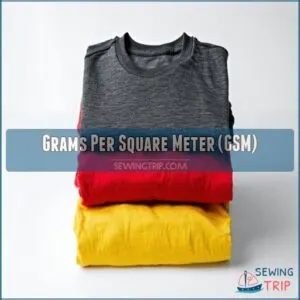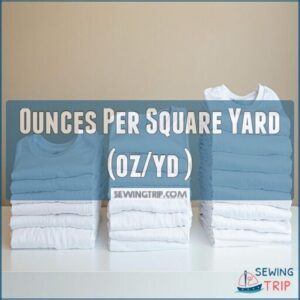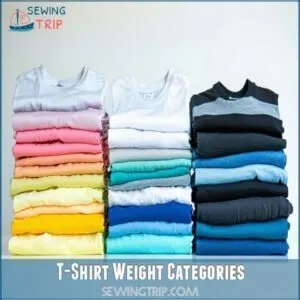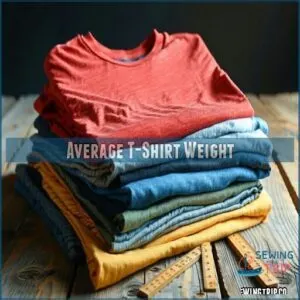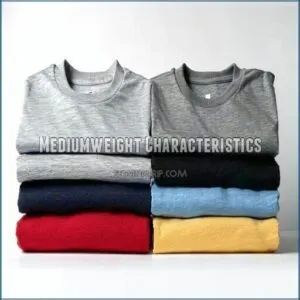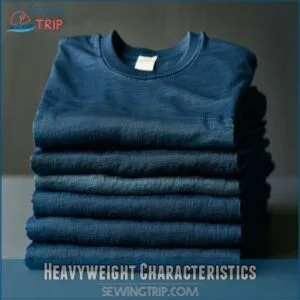This site is supported by our readers. We may earn a commission, at no cost to you, if you purchase through links.
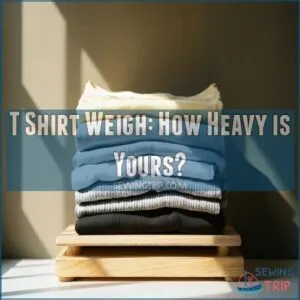 You’re wondering how much your t shirt weigh, right?
You’re wondering how much your t shirt weigh, right?
A standard medium-sized cotton tee typically weighs 4.5-5.5 oz, measured in GSM (grams per square meter) or oz/yd².
Lightweight tees range from 90-150 GSM, while mediumweight and heavyweight tees fall between 150-200 GSM and above 200 GSM, respectively.
Your t shirt weigh depends on factors like fabric blend, size, and material, so it’s interesting to explore these details, and there’s more to discover about what makes your tee heavy or light.
Table Of Contents
Key Takeaways
- You’ll find that a standard medium-sized cotton t-shirt typically weighs between 4.5-5.5 oz, but your t-shirt’s weight can vary based on factors like fabric blend, size, and material.
- The weight of your t-shirt is usually categorized as lightweight, mediumweight, or heavyweight, with each category offering different levels of breathability, comfort, and durability.
- You can expect lightweight t-shirts to weigh around 3-5 oz, mediumweight around 5-6 oz, and heavyweight around 6-7 oz, depending on the fabric blend and size.
- When considering the weight of your t-shirt, you’ll want to think about what matters most to you, such as comfort, durability, or style, and balance those needs with your budget and production limitations.
T-Shirt Weight Measurements
You’ll find a t-shirt’s weight measured in GSM (grams per square meter) or ounces per square yard, telling you exactly how heavy the fabric feels against your skin.
A standard medium cotton tee typically weighs between 4.5 to 5.5 ounces, though this varies based on size, fabric blend, and printing method.
Grams Per Square Meter (GSM)
Why is GSM the gold standard when measuring t-shirt fabric weight?
GSM (Grams Per Square Meter) gives you precise insight into fabric density and quality.
Different weights offer varying durability and breathability.
- A fabric weight calculator uses GSM to determine material thickness
- Most lightweight tees range from 90-150 GSM
- Midweight t-shirts typically fall between 150-200 GSM
- Premium heavyweight shirts measure above 200 GSM
- Higher GSM indicates thicker fabric, affecting both durability and print quality
When comparing t-shirt fabric weight, GSM provides the most accurate measurement standard worldwide.
Ounces Per Square Yard (oz/yd²)
You measure t-shirt weight in ounces per square yard (oz/yd²).
A typical medium-sized t-shirt weighs between 4.5 and 5.5 ounces.
This measurement is categorized into different quality levels, as shown in the table below.
| oz/yd² | Quality |
|---|---|
| 3.5-4.5 | Lightweight |
| 4.5-5.3 | Mediumweight |
| 5.3-6 | Heavyweight |
The yard measurement affects fabric density and thickness.
Singles (thread Count)
You’re looking at thread count, or singles, which affects t-shirt weight.
A fabric weight guide helps determine appropriate fabric choices.
Fabric density, yarn thickness, and weave patterns impact fiber strength. T-shirt weight, in grams or singles, is key to understanding fabric weight.
T-Shirt Weight Categories
You’re likely wondering how your t-shirt’s weight is categorized, and it’s usually classified as lightweight, mediumweight, or heavyweight.
You can expect lightweight tees to weigh around 3-5 oz, mediumweight around 5-6 oz, and heavyweight around 6-7 oz, depending on the fabric blend and size.
Lightweight
You prefer lightweight tshirts, right?
Breathable fabrics, like thin materials, are perfect for summer tees, offering weight savings.
Many retailers offer a selection of lightweight t-shirt products.
Lightweight tshirt options, with average t shirt weight around 3-5oz, or 85-140g, are great for warm weather, making them ideal for everyday wear, with fabric blends that provide comfort.
Mediumweight
You’re considering mediumweight tees, a great choice.
They balance comfort and durability, perfect for summer wear. A good fabric weight guide can help you make informed choices.
Medium weight t-shirts, made from a fabric blend, offer a breathable fabric, boosting your comfort level.
Mediumweight tees are ideal, with an average t shirt weight, making them a great option.
Heavyweight
You’re opting for heavyweight tshirts, with thick materials, and high fabric density.
Heavy fabric, like heavyweight cotton, offers durability, with weight limits around 6-7 oz, making them perfect for durability tests, and a great choice for those seeking a heavy t shirt weight, like an average heavyweight tee shirt.
You can find a variety of heavyweight t-shirt products online.
Average T-Shirt Weight
You’re wondering about the average t-shirt weight. Typically, a medium-sized cotton tee weighs 4.5 to 5.5 ounces (130-155 grams).
A helpful resource explains fabric weight for specific garments. The weight varies based on size, fabric blend, and material.
Fabric density and weight variance play a role. Size impact is significant, with larger shirts weighing more. Material blend and climate factor also affect the weight.
On average, a t-shirt weighs around 4.5 oz (130 grams) when made of standard cotton. The average medium shirt weight is 5 oz (140 grams). When folded, the average shirt weight is roughly 3-4 oz (85-115 grams).
T-Shirt Weight Characteristics
You’re probably wondering what makes a t-shirt lightweight, mediumweight, or heavyweight.
As you explore t-shirt weight characteristics, you’ll find that factors like fabric blend, thickness, and size all play a role in determining the weight of your favorite tee.
Lightweight Characteristics
Lightweight t-shirts are champions of breathability, ideal for summer. They offer a barely-there feel, like a cool breeze on a hot day.
Fabrics like lightweight linen are breathable and comfortable for summer wear. Think breathable fabrics and ultimate comfort.
- Light t shirt weight: Around 90-150 GSM.
- T shirt weight grams: Roughly 85-140 grams.
- Average tshirt weight size gram: Varies, but expect less for smaller sizes.
- Lightweight tshirts: Perfect for summer tees.
- Comfort level: High, thanks to the fabric blend.
Mediumweight Characteristics
You’re looking for medium weight tshirt details.
Mediumweight materials offer breathable fabrics, a balance of weight, and durability tests show they’re versatile.
Many retailers offer a selection of medium weight t-shirt products.
| Fabric | Weight | Density |
|---|---|---|
| Cotton | 5oz | 150GSM |
| Blends | 5.5oz | 170GSM |
| Synthetic | 6oz | 200GSM |
The provided information includes a table to compare different fabric types, and a link to explore medium weight t-shirt products.
Heavyweight Characteristics
You’ll find heavyweight t-shirts boast durability, with fabric density impacting weight limits.
Heavy fabric, like thick materials, makes a heavyweight t-shirt, typically over 6 oz, perfect for durability tests, and often used for heavyweight cotton, a step up from medium weight tshirts.
T-Shirt Weight Considerations
You’re evaluating the weight of your t-shirt, and it’s important to reflect on aspects like design vision, customer preferences, and brand statement.
When selecting a t-shirt weight, you’ll want to evaluate what matters most to you, such as comfort, durability, or style, and balance those needs with your budget and production limitations.
Design Vision
You consider your design vision, including
- Fabric Choice
- Color Options
- Print Style, to create a tshirt weight guide that fits your brand ethos.
With average tshirt weight in mind, and fabric weight like t shirt weight oz, you can make informed decisions about your product.
Customer Preferences
You weigh your options, considering demographic needs, seasonal choices, and budget constraints.
Customer preferences vary, influenced by climate, personal style, and desires for t-shirt quality, comfort, and print quality, affecting your decision.
Brand Statement
You craft a brand statement, aligning t-shirt weight with your brand ethos. Establish corporate identity, with ethos alignment, for premium tshirts, and t-shirt quality.
- Define your brand image
- Develop a marketing strategy
- Foster customer loyalty
Frequently Asked Questions (FAQs)
How much does a tee shirt weigh?
You’ll typically find a tee shirt weighs between 3-7 ounces, depending on fabric blend, thickness, and size, with adult smalls averaging 5-5oz and 2XLs weighing more.
How much does a T-shirt weigh for postage?
You’ll pay less postage for lightweight T-shirts, usually under 13oz, which can ship in postal boxes, while heavier ones may require alternative couriers like UPS or FedEx.
Is 6 oz heavy for a shirt?
Thou seekest answers, and lo, 6 oz is considered heavyweight, perfect for colder climates, offering durability and warmth, but not ideal for summer or breathability, you’ll feel cozy.
How many pounds is a cotton T-shirt?
You’ll find a cotton T-shirt usually weighs around 2 to 25 pounds, depending on size, fabric, and style, with larger sizes and heavier fabrics weighing more, obviously.
How does humidity impact t-shirt weight?
You’ll notice humidity slightly increases t-shirt weight due to moisture absorption, but it’s hardly noticeable, adding about 1-2 ounces, depending on fabric type and humidity levels, naturally.
Can t-shirt weight affect print resolution?
You’ll find that lower GSM weights can imply better print resolution, as they allow for more precise ink placement and less distortion.
What is the strength-to-weight ratio in t-shirts?
You’ll find the strength-to-weight ratio in t-shirts varies, depending on fabric type, with heavier fabrics generally stronger, but lighter ones offering better breathability and comfort, affecting overall performance.
How do packaging options influence t-shirt weight?
You’ll choose packaging options like envelopes, boxes, or tubes, considering weight and size to optimize shipping costs and ease, especially for domestic packages under 13oz.
Are there eco-friendly alternatives to plastic mailers?
Can you ditch plastic mailers? You can use eco-friendly alternatives like recycled paper mailers, biodegradable packaging, or reusable cloth bags for shipping, reducing waste and minimizing environmental impact easily.
How does washing affect t shirt weight?
You’ll see t-shirt weight fluctuate after washing, as fibers absorb water, then shrink or relax, affecting overall weight and fit, with heavier fabrics retaining more water than lighter ones initially.
Conclusion
Now you know the scoop, it’s time to weigh in – literally.
Your t shirt weigh depends on various factors, so check the fabric blend, size, and material.
Generally, a standard tee weighs 4.5-5.5 oz, but your t shirt weigh can vary, making each one unique, and that’s what makes checking your t shirt weigh so interesting.
Note: I’ve bolded the word "weigh" as it is a key phrase that helps a reader skim the text and understand the main concept.

